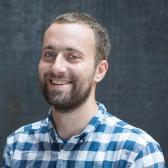
“Polish Shtetl after the Holocaust? Jews in Dzierżoniów, 1945-1968”
Professional Background
Dr. Kamil Kijek received his PhD from the Institute of History at the Polish Academy of Science in Warsaw (Poland) and is a Prins Foundation postdoctoral fellow at the Center for Jewish History in New York. He possesses skills in Polish, English, Hebrew, Russian, Yiddish, and German. While in residence at the Jack, Joseph and Morton Mandel Center for Advanced Holocaust Studies, Dr. Kijek conducted research on his project, “Polish Shtetl after the Holocaust? Jews in Dzierżoniów, 1945-1968.”
A selection of Dr. Kijek’s publications include, “Between Love of Poland, Symbolic violence and anti-Semitism On the Idiosyncratic Effect of the State Education System Among the Jewish Youth in Interwar Poland” in Polin Studies in Polish Jewry (forthcoming) and “Ha radicalism ha politi shel ha noar ha yehudi be shtetl polani bein milhamot ha olam” (Political radicalism of the shtetl youth in Poland between Two World Wars) in Yalkut Moreshet vol.92-93 (April 2013, p. 20-59). Dr. Kijek’s conference presentations partly include, “National Core or Polysytem? Language and Jewish Youth in Interwar Poland” at the XVI World Congress of Jewish Studies in Jerusalem, 2013, and “Faithful but Transgressive? Political Consciousness and Patterns of Cultural Consumption among Jewish Youth in Interwar Poland" at the 46th Annual Conference of the Association of Jewish Studies in Baltimore, December 2014.
Fellowship Research
For his Sosland Family fellowship at the Mandel Center, Dr. Kijek used the records of the World Jewish Congress, the Hashomer Hatzair World Headquarters, and Rescue, Refugee, and Displaced Persons archival collection to further investigate the Jewish community of Dzierżoniów during the period of 1945-1968, where one of the most important Jewish centers in post-war Poland was located.
Dr. Kamil Kijek was in residence at the Mandel Center from July 1 to September 30, 2015.
